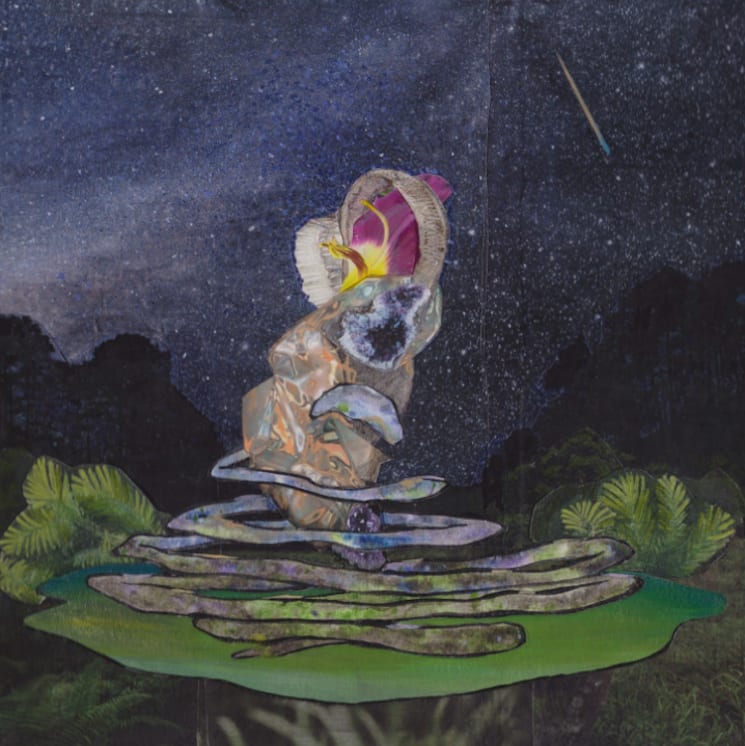Meteors Could Come Down, the latest album by long-running Toronto-based duo LAL, is replete with enticing textural, melodic and instrumental elements. The album finds vocalist Rosina Kazi and electronic maestro Nicholas Murray embracing a more minimalistic approach than used on previous releases.
The album opens with "The Bitter End," a sultry track that addresses the paradoxes of love: "Sometimes I wish that my heart / could fly away from you," an electro-robotic soundscape contrasted with Kazi's uber-romantic vocal. "End of This World Together" explores a less-is-more palette, electronic beats and synth-y chords complementing Kazi's sensual voice.
The title song is the highpoint of the project. Kazi's intro, effected to conjure a heartbroken automaton, brings to mind the resonant voice of Anohni, particularly 2016's Hopelessness. Kazi's treated voice is well juxtaposed with an additional and cleaner vocal that emerges from Murray's wash of synths and dramatic instrumental accents.
"No Excuses" explores the intersection of electronica, dream pop and R&B, Kazi's melody emerging from a tremulous soundscape. "Free and Broken" features a welter of tumultuous sonics, with Kazi reflecting wistfully on the early days of a relationship: "Oh I miss the ways / that we were free and broken."
The album closes with ode of gratitude "Who You Are": "With you, I can do anything / with you, I can be anyone / with me, you can be who you want." The song is one part a déclaration d'amour and one part a positive reframing of the stasis that often accompanies long-term commitment.
Meteors Could Come Down is a mercurially transportive project, the signature downtempo and ambient elements of LAL's earlier recordings less pronouncedly articulated, the album's melodies occurring as more spontaneously crafted and possibly scat-inspired. With Meteors Could Come Down, LAL revel in minimalism, finding fresh ways to blend the au naturel qualities of Kazi's voice and Murray's posthumanist soundscapes.
(Coax)The album opens with "The Bitter End," a sultry track that addresses the paradoxes of love: "Sometimes I wish that my heart / could fly away from you," an electro-robotic soundscape contrasted with Kazi's uber-romantic vocal. "End of This World Together" explores a less-is-more palette, electronic beats and synth-y chords complementing Kazi's sensual voice.
The title song is the highpoint of the project. Kazi's intro, effected to conjure a heartbroken automaton, brings to mind the resonant voice of Anohni, particularly 2016's Hopelessness. Kazi's treated voice is well juxtaposed with an additional and cleaner vocal that emerges from Murray's wash of synths and dramatic instrumental accents.
"No Excuses" explores the intersection of electronica, dream pop and R&B, Kazi's melody emerging from a tremulous soundscape. "Free and Broken" features a welter of tumultuous sonics, with Kazi reflecting wistfully on the early days of a relationship: "Oh I miss the ways / that we were free and broken."
The album closes with ode of gratitude "Who You Are": "With you, I can do anything / with you, I can be anyone / with me, you can be who you want." The song is one part a déclaration d'amour and one part a positive reframing of the stasis that often accompanies long-term commitment.
Meteors Could Come Down is a mercurially transportive project, the signature downtempo and ambient elements of LAL's earlier recordings less pronouncedly articulated, the album's melodies occurring as more spontaneously crafted and possibly scat-inspired. With Meteors Could Come Down, LAL revel in minimalism, finding fresh ways to blend the au naturel qualities of Kazi's voice and Murray's posthumanist soundscapes.
